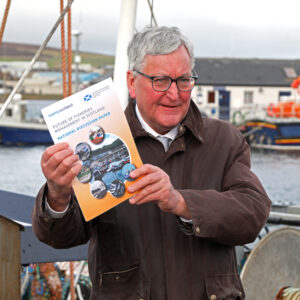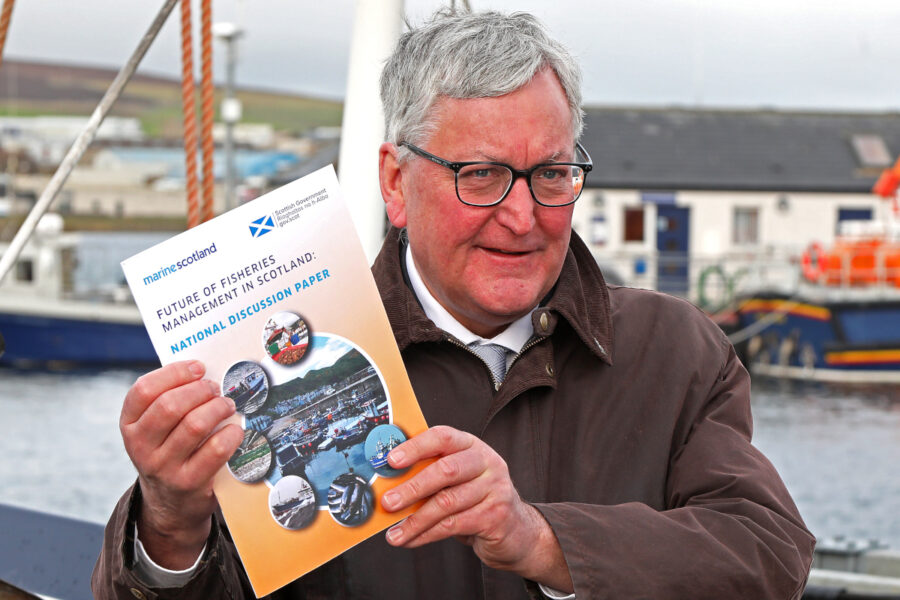Wide-ranging debate on Scots industry future
Scotland’s fishing industry is being asked to take part in a wide-ranging discussion on the Scottish government’s vision for the future of fisheries, reports Tim Oliver
Scottish fisheries minister Fergus Ewing launched a national discussion paper in Orkney last week, setting out the government’s ideas for the industry’s future.
Similar meetings will be held across Scotland to allow individuals, businesses and communities involved in fishing to have their say in what a new strategy for fisheries management should look like.
Key priorities in the strategy include:
- Ensuring that access to Scottish waters and fishing opportunities is not traded away by the UK government
- Continuing the use of TACs as Scotland’s primary stock management tool in future
- Ensuring that Scottish fishing quota is in the hands of active Scottish fishermen
- Supporting the principle of a discards ban, but working with stakeholders to put a more workable approach in place
- Supporting new entrants by creating additional licences and quota
- Pressing the UK government to introduce a new work permit system to secure sustainable labour supply for the fishing industry.
Launching the discussion paper, Fergus Ewing said it was not intended ‘to provide all the answers, but rather act as a catalyst for us to move forward together, and develop ideas which can help deliver an inclusive, productive approach’.

Scottish fisheries minister Fergus Ewing launched the national discussion paper in Orkney last week. (Photo: Tom O’Brien)
The paper would help the Scottish government to develop its approach to local management and partnership working, which is already in place.
“It’s vital that we come together to shape our future approach, and that everyone involved in fishing has their say in that process,” said Fergus Ewing.
He stressed the need to manage fisheries sustainably for the future, and the ‘inevitable’ changes that Brexit will bring.
In the introduction to the 63-page document, Fergus Ewing says, “I want to hear what you think. I want to take onboard your concerns and your ideas. I want your buy-in. Only with that can Scotland continue to be the world-leading, diverse and inclusive, proud fishing nation that we want to be. This paper is not a formal consultation but a genuine discussion opportunity to explore change, support status quo and unearth creativity.”
Once Brexit takes effect, a new regime will be required to ensure that Scotland’s fishing industry can continue to operate both legally and sustainably.
The document says the new strategy will not start from a blank sheet, but will build on existing policies, such as the National Marine Plan (NMP) and the Inshore Fisheries Strategy. “Where needed, we are seeking to make improvements to policies which could benefit from a more tailored Scottish approach, including options for our future approach to discards.”
The Scottish government says it wants to place co-management of fisheries with industry ‘at the heart of our policy development and decision-making. Fisheries co-management should be flexible and co-operative’. Local decisions should be devolved to local stakeholders, although it accepts there will be challenges with such a policy.
The document discusses fishing opportunities; quota management and effort control; strengthening economic links to make the most of Scotland’s resources; future catching policy, including a discards ban; technical and spatial conservation measures; fleet capacity and licensing; funding; the workforce in both catching and processing sectors; and innovation, science and technology.
Marine Scotland is asking for responses to the document by 7 June, 2019. It then aims to issue a formal consultation document in winter 2019. This will set out ‘our agreed shared vision, with a set of concrete proposals and high-level priorities to help guide decisions over the coming years.
The full discussion document can be seen at: bit.ly/2NPLlG5
Fresh look at pelagic and new-entrant licences
The paper points out that restrictions on licences and their costs have led to a consolidation of the fleet, particularly in the pelagic and North East demersal fleets.
Small-scale operators cannot compete, and entry to the industry is compromised.
But fishing capacity has to be in line with fishing opportunities, and there must be caution against increasing capacity. However, the pelagic fleet may be a special case. “Any increase in engine power or tonnage would lead to quotas being taken earlier in the season, resulting in a shorter fishing season. Removing capacity restraints for the pelagic fleet would result in reduced competition for licences, thus facilitating the upgrading and modernisation of new smaller vessels.”
The government will consider the creation and sale of additional licences for the pelagic sector in line with additional opportunities, supported by accompanying quota.
Also, for new entrants, the paper says that ‘we will commit to looking at creative ways in which we can provide additional licences and quota to assist new entrants into the system across all vessel types. Quota will not be given on an FQA basis, but retained by the Scottish government for use by new entrants.”
Quotas main fishing allocation method
Stocks will be managed by MSY, but on a ‘sensible direction of travel’ basis, rather than by setting target dates.
TACs vs effort
In a discussion of TACs versus effort control, the document examines the pros and cons of both systems, but says that the government is committed to retaining TACs/quotas as the primary method of establishing fishing opportunities.
It may also introduce quotas for current non-TAC species, for ‘clean’ species with a high rate of survival, such as shellfish.
Globally, TAC systems are the norm in fisheries management, and while it has faults, ‘it has proven a simpler and more effective way to manage most fisheries’.
There is also an international obligation to set catch limits for most stocks, and it would not be possible to have ‘an isolated effort-based system’.
Effort control may be appropriate for some single-species management, but ‘in the mixed fisheries of the North Sea and West of Scotland, we see effort as neither a sensible nor deliverable management approach’.
Quota management system
“We will do everything we can to ensure Scottish fishing quota is retained in the hands of active Scottish fishermen, and that quota speculation is ended,” says the paper.
“The Scottish government is committed to the continued use of the FQA system as the main means of allocation of fishing opportunities, as this acknowledges the investment made by fisheries businesses and provides a degree of stability and certainty for future investment.”
While this means that POs are likely to continue to play an important role in the future, ‘we also want to consider broadening the pool of quota management organisations, and we want to explore the option of devolving the management of individual fisheries to more local groups’.
Improving FQA system
“There are potentially significant amounts of quota held by individuals and companies with no direct interest in the fishing industry who are effectively using quotas as a speculative asset. The impact of this behaviour is to inflate costs associated with quota leasing, disadvantaging small-scale fishers in particular. The Scottish government will bring forward measures to minimise such speculation.”
Non-sector vessels
In the non-sector in Scotland, there are 156 over-10m licences and 1,430 under-10m licences.
The distinction between under-10m and over-10m vessels was historically to account for differences in fishing power. But modern technology and vessel design mean it is now ‘questionable’ that two separate non-sector pools are needed.
“Both non-sector segments have very restricted fishing options and limited ability to diversify into other fisheries. Increasing the quantity and number of stocks that the non-sector could fish would help relieve pressure on non-quota stocks and allow non-sector vessels to diversify,” says the paper.
Possible management options include: allowing the non-sector to lease quota; establishing stock-specific POs; and allocating more quotas to the pools. “Each would have a different impact, and represent a significant change to the way we currently manage quota in Scotland.”
The Scottish government says it wants to expand delegation of quota management to industry in the future. This would include exploring whether this could be opened up beyond POs, and whether there could be a role for IFGs and local communities.
Strengthened inshore management
For the inshore fleet, the Scottish government believes the existing regional inshore fisheries groups (RIFGs) can take a more formal role, be given a statutory basis, and be expanded to 12 nautical miles, to help deliver more effective inshore fisheries management.
It plans to introduce vessel tracking for the under-12m fleet, linked initially to access to buffer zones around all MPAs. REM could also potentially be used for higher-risk vessels operating in sensitive areas.
Also for the inshore fleet, the Scottish government believes ‘there is merit in introducing a significant low-impact trial that will separate mobile activity from static gear and recreational users’. It will also consider specific zones where mobile-gear bottom-contact fishing will not be permitted.
But blanket applications of such a measure would not be appropriate, given ‘the vastly differing locations of fishing opportunities within distinct geographic areas’.
In many cases, there is excellent co-operation between different activities. Conflict is often between very small numbers of both mobile- and static-gear vessels, and on a repeat basis.
Such vessels may have their licences suspended or removed permanently if their actions prevent effective fisheries management.








